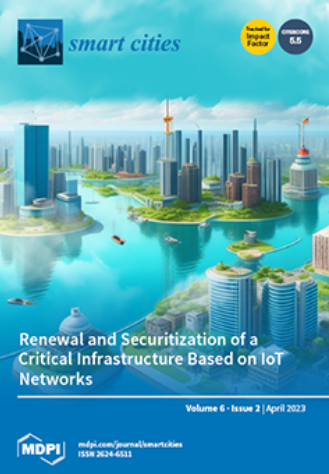Key Factors Affecting Smart Building Integration into Smart City: Technological Aspects
IF 5.5
Q1 ENGINEERING, ELECTRICAL & ELECTRONIC
引用次数: 1
Abstract
This research presents key factors influencing smart building integration into smart cities considering the city as a technological system. This paper begins with an overview of the concept of smart buildings, defining their features and discussing the technological advancements driving their development. The frameworks for smart buildings are presented, emphasizing energy efficiency, sustainability, automation, and data analytics. Then, the concept of a smart city and the role of digitalization in its development is explored. The conceptual framework of smart building into a smart city is presented, contributing to understanding the complex process of integrating smart buildings into smart cities. Further research delves into the factors influencing the integration of smart buildings into smart cities, focusing on energy, mobility, water, security systems, and waste management infrastructure domains. Each thematic area is examined, highlighting the importance of integration and the associated challenges and opportunities, based on research in the literature and the analysis of case studies. This enables the identification of 26 factors influencing integration and the synthesis of findings. The findings indicate that the successful integration of smart buildings into smart cities requires attention to multiple factors related to smart energy, smart mobility, smart water, smart security, and smart waste management infrastructures. The results obtained from this research provide valuable insights into the factors influencing smart building integration into a smart city from a technological perspective, enabling stakeholders to make informed decisions and develop strategies paving the way for sustainable, resilient, and efficient urban environments.影响智慧建筑融入智慧城市的关键因素:技术层面
本研究将城市视为一个技术系统,提出了影响智能建筑融入智能城市的关键因素。本文首先概述了智能建筑的概念,定义了其特征,并讨论了推动其发展的技术进步。介绍了智能建筑的框架,强调能源效率、可持续性、自动化和数据分析。然后,探讨了智慧城市的概念以及数字化在其发展中的作用。提出了智能建筑融入智慧城市的概念框架,有助于理解智能建筑融入智能城市的复杂过程。进一步的研究深入探讨了影响智能建筑融入智能城市的因素,重点关注能源、交通、水、安全系统和废物管理基础设施领域。根据文献研究和案例研究分析,对每个主题领域进行了审查,强调了一体化的重要性以及相关的挑战和机遇。这使得能够确定影响整合的26个因素并综合研究结果。研究结果表明,智能建筑与智能城市的成功融合需要关注与智能能源、智能交通、智能水务、智能安全和智能废物管理基础设施相关的多个因素。这项研究的结果从技术角度对影响智能建筑融入智能城市的因素提供了宝贵的见解,使利益相关者能够做出明智的决策,并制定战略,为可持续、有弹性和高效的城市环境铺平道路。
本文章由计算机程序翻译,如有差异,请以英文原文为准。
求助全文
约1分钟内获得全文
求助全文
来源期刊

Smart Cities
Multiple-
CiteScore
11.20
自引率
6.20%
发文量
0
审稿时长
11 weeks
期刊介绍:
Smart Cities (ISSN 2624-6511) provides an advanced forum for the dissemination of information on the science and technology of smart cities, publishing reviews, regular research papers (articles) and communications in all areas of research concerning smart cities. Our aim is to encourage scientists to publish their experimental and theoretical results in as much detail as possible, with no restriction on the maximum length of the papers published so that all experimental results can be reproduced.
 求助内容:
求助内容: 应助结果提醒方式:
应助结果提醒方式:


